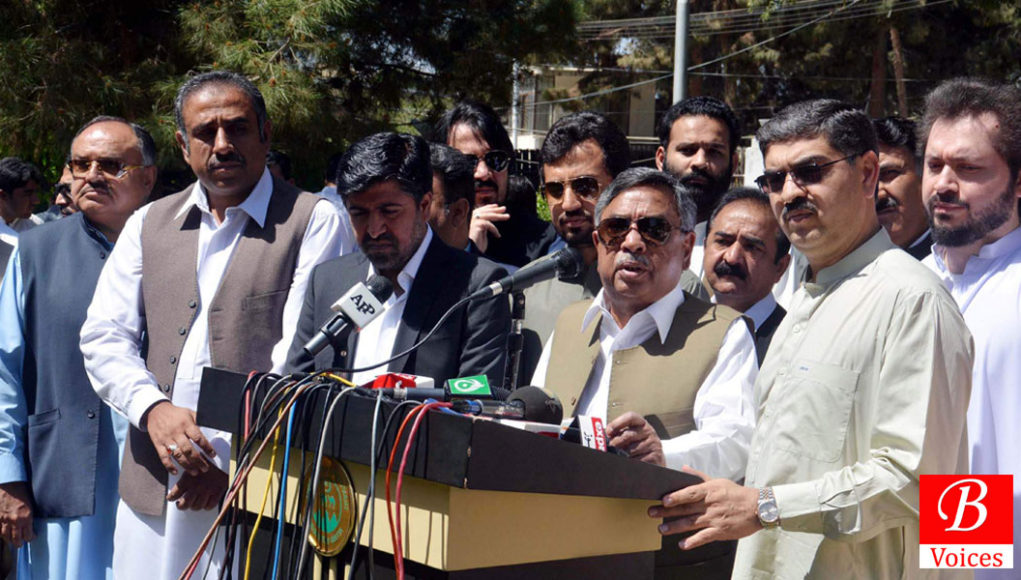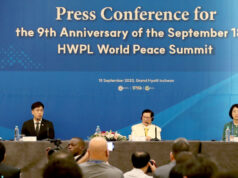The southwestern province of Baluchistan, geographically the largest in Pakistan, came under national media attention when a new political party was launched there. The Balochistan Awami Party (BAP), which translates as “Party of People of Baluchistan,” was launched on March 29 by the province’s chief minister along with dissident members of two national parties, PML-N and PML-Q.
The BAP comprises politicians whose surnames are synonymous with power in Baluchistan. They are influential tribal chiefs who rule their districts like kings with no accountability whatsoever. They win the elections each and every time because they muscle out any political opposition.
They are part of every government in the province and change political parties conveniently for the sake of retaining power. In the past, they enjoyed the perks and privileges of power largely by joining provincial chapters of federal parties such as the Pakistan Peoples Party (PPP), Pakistan Muslim League (N) and Pakistan Muslim League (Q). This time they grouped together to form their own party to acquire even more power and control over the politics of Baluchistan.
Since 1972, when the first civilian government was formed in Baluchistan, the politics of the province has revolved around three types of parties: ethnic nationalist parties, right-wing Islamist parties, and provincial chapters of federal parties that function all over Pakistan. The BAP is the first venture of its kind where politicians who claim to base their politics on federalist lines have come up with their own provincial party. They claim to fight for the rights of Baluchistan without using the ethnic nationalist card that is deemed treacherous by the ultra-right in Pakistan.
There are two conflicting views about the emergence of the BAP out of the blue. One view is that for the first time Baluch politicians who have federalist tendencies, as opposed to ethnic nationalist tendencies, have formed a political party. However, others allege that this is the handiwork of the mighty Pakistani establishment.
The group who founded the BAP has scored astonishing political victories during the last three months. In January this group toppled the provincial government of Nawab Sanaullah Khan Zehri, who belongs to PML-N, the party founded by the former three-time prime minister of Pakistan, Nawaz Sharif.
After that, this group managed to elect their own chief minister, Abdul Quddus Bizenjo, 44, and also managed to win six out of 11 seats in Senate elections from Baluchistan. Needless to say, these elections were marred by claims of horse-trading, where members of the Baluchistan Provincial Assembly were accused of selling their votes to the elected senators who later joined the BAP.
Even more surprising is the fact that same group managed to elect Sadiq Sanjrani as chairman of the federal Senate, which is third-highest constitutional position in Pakistan after the President and Prime minister.
The way this group of politicians who formed the BAP have managed to achieve so much in such a small period of time raises questions. In a province like Baluchistan where there is a history of individual-dominated politics and political divisions, it’s hard to believe that a group of people who have no ideological common grounds can collaborate so effectively. That’s the context behind allegations that the Pakistani establishment has maneuvered politics in Baluchistan by using the BAP as a tool.
These allegations can be further contextualized in the scenario of national-level politics in Pakistan. At center, PML-N is the ruling party, and lately, it has been under attack from the judiciary. Nawaz Sharif, former chief of PML-N, was not only disqualified as prime minister but also as party chief by the apex court of Pakistan in the Panama Papers case.
There is a general impression that PML-N is facing the wrath of the establishment in a power battle because this party has gained too much influence. Therefore, toppling the PML-N government in Baluchistan and preventing PML-N from winning Senate seats from Baluchistan was seen as the establishment settling scores with the party.
There is no way one can substantiate the allegations that the BAP is the brainchild of the Pakistani establishment. These allegations will remain allegations and further develop into conspiracy theories, but there is no concrete evidence to back them up. However, given the political history of Pakistan, it’s not hard to imagine why these allegations can’t be proved.
Furthermore, the inception of the BAP, irrespective of who is behind it, will not bode well for this economically deprived and poorly governed province of Pakistan. The reason is that the BAP is likely to win at least 20 of the 65 seats in the provincial assembly and it will form a government with other smaller parties. As a result, the tribal elite of Baluchistan who are in power now and have always been in power will remain in power. This means no political accountability for the tribal and political elite of Baluchistan, which is against the basic democratic principles of preventing concentration of power.
Subsequently, it’s feared that the bad governance and corrupt practices will continue in Baluchistan because of a lack of political accountability.
All the aforementioned fears can be washed away if the BAP proves its democratic credentials despite the shadowy circumstances under which it was established. It could vehemently battle for the rights of Baluchistan by asking for greater provincial autonomy, and demand a new National Finance Commission Award for Baluchistan.
These can be brushed aside as an overambitious wish list, but this is what the BAP has to do to respond to the growing criticism it faces.
Originally published in Asia Times
Disclaimer: Views expressed in this article are those of the author and Balochistan Voices not necessarily agrees with them.
Share your comments!








